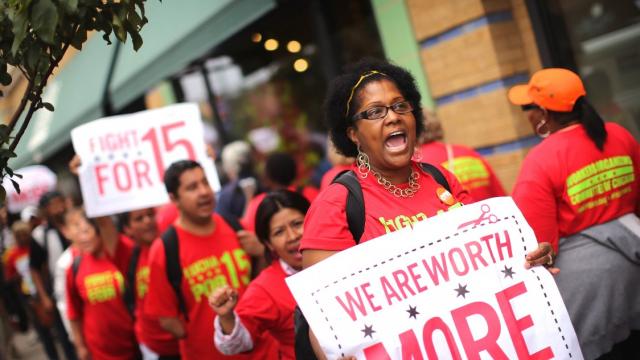
In 2010, on the heels of the Great Recession – the nation's biggest economic calamity since the Great Depression – one out of 10 people looking for work couldn't find a job. The crisis was widely felt in communities large and small across the country. But the effects were far from equal.
For example, the peak of unemployment for white workers who were unemployed in 2010 soared to 8 percent. But as Algernon Austin, a researcher at the Economic Policy Institute, noted in the report "#BlackWorkersMatter" earlier this year, such devastating levels of joblessness were nothing new to African Americans. Over the last 52 years, Austin writes, "[T]he annual unemployment rate for blacks has averaged nearly 12 percent. The typical African-American community faces a severe unemployment crisis year after year after year."
The key role of race in chronic joblessness is just one of the reasons that African-American, labor and community leaders are calling for a new national commitment to organizing black workers. As Marc Bayard, who leads the Black Worker Initiative at the Institute for Policy Studies argues in the "#BlackWorkersMatter" report:
"Among the most important things that black workers need to survive and grow in today's economy are targeted racial and economic justice programs and projects designed to foster, expand and support opportunities for black worker organizing and collective action."
The Coalition of Black Trade Unionists, founded in 1972 to increase the voice of African-American union members in the labor movement, echoes the sentiment in its own report released in July:
"Black workers have been, for the working class as a whole, the canary in the mine. Black workers are a segment of the working class that are normally subject to the forward thrusts of employer offensives. It is the segment of the working class that suffers the most from unemployment and underemployment ... What befalls the black worker inevitably confronts the bulk of the U.S. working class."
Nowhere is this clearer than in the South, where close to half of all African Americans live today. As the Institute for Southern Studies and others have documented, for decades Southern states pursued a low-road economic strategy, attempting to lure companies to set up shop in the region with the promise of keeping wages low and unions out. That approach continues to this day, as witnessed by threats made by state leaders in South Carolina and Tennessee when workers attempted to organize unions at Boeing and Volkswagen, respectively.
The shift to less-secure, lower-paying jobs is a national issue, but it's especially pronounced in the South. A 2015 report by the Alliance for a Just Society estimates that 52 percent of new jobs in the South paid less than $15 an hour — which, even with lower costs factored in, is well below a living wage.
Just like unemployment, the South's low-wage economy affects everyone, but it hits African-American and other workers of color harder. Historically, African Americans in the South were locked into lower-paying job categories. Today, as the "#BlackWorkersMatter" report observes, "Between 2010 and 2012, 38.1 percent of black workers earned low wages compared to 25.9 percent of white workers," with "low wages" meaning people making two-thirds of the median wage of a full-time worker.
As groups like Black Workers for Justice and the Coalition of Black Trade Unionists have long argued — and reports like "#BlackWorkersMatter" make the case today — a focus on black labor would have a ripple effect that benefits all workers, especially in the South.
For one, it's a way to openly confront the way racism has undermined efforts to organize in Southern states, exploiting white racial sentiments to divide workers and accept racially-stratified job arrangements. Recently, the AFL-CIO — which has announced a renewed commitment to labor organizing in Southern states — launched a Labor Commission on Racial and Economic Justice that acknowledged the "ugly history of racism" in the labor movement and argued that creating a better economy required "power that can only come from unity, and unity has to begin with having all our voices be heard, on all sides of those color lines."
As the South grows more diverse, with rising numbers of both newcomers from other parts of the country as well as immigrants from other nations, attitudes about unions may shift in the South: 49 percent of Latinos, for example, have a favorable few of unions, compared to 45 percent of whites, according to a recent Pew survey. But African Americans have by far the highest support for unions among all racial groups, at 60 percent — a level of support that could buoy organizing for all workers in the region.
But ultimately, the value of organizing black workers in the South and elsewhere is the possibility it holds for strengthening the economic power of African-American communities. As organizer Lola Smallwood Cuevas argued in The Huffington Post:
"The cause of the Black job crisis is not just the economy. It's the lack of power. No matter how "strong" the economy, we are disproportionately unemployed and in low-wage jobs ... Across the nation, 38 percent of Black workers receive low-wages. It is a lack of power that allows these outcomes to occur and these outcomes destabilize our families and the subsequent poverty is at the root of mass incarceration, homelessness, health disparities and the educational divide."
3 WAYS TO SHOW YOUR SUPPORT
- Log in to post comments













